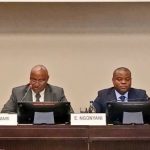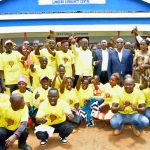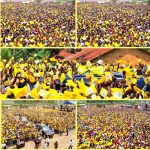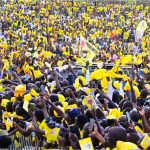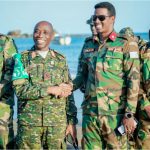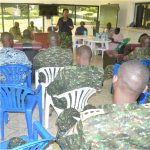Published on 25/09/2025
The NRM Party presidential flag-bearer Yoweri Kaguta Museveni is officially being nominated to contest the 2026 general elections, marking his seventh elective term of office. What does this nomination signify to the NRM, and Uganda?
The nomination of President Museveni as a presidential candidate signifies a radical shift in the trajectory of the country’s democratic framework. For the first time in Uganda’s history, we have witnessed over 180 Ugandans expressing interest to contest for the presidency, with the youngest aspirant being only 18 years old.

As of now, 30 presidential hopefuls have duly returned nomination forms to the Independent Electoral Commission. This is the promise of democracy that the NRM under President Yoweri Museveni pledged to Ugandans when we ascended to power in 1986; it is point number one of the original Ten Points Programme—restoration of democracy with its embedded principles of constitutionalism and rule of law.

For the record, the nomination of President Museveni is just days away from the 30th anniversary of the promulgation of the 1995 constitution; the real constitution that reflects the true wishes and aspirations of the people—placing them at the centre of decision-making and management of their country.
This hasn’t happened before since Uganda was founded first as a colonial enclave, and foremost as a modern republic. Ugandans and all people of the world should know that the nomination of President Museveni is a celebration of an era: 40 years of peace, stability, security; and accelerated socio-economic transformation.
One would ask as to why the NRM has still selected President Museveni to, again, run for office as the Party flag-bearer?
This is a good question, and it’s one question which has been asked over the years by various people. To understand this perspective, one should understand how the NRM democratic process works and keeps evolving. The NRM runs a consolidated democratic process.
This process involves structural leaders of the party from the national level running down to the grassroots. The Party embarked on a year-long process of generating a credible register. We ended up with 20,760,00 million members on the party register; of whom 18,500,000 members are eligible to vote. These are the members who actively participated in democratically electing about 2,535,730 leaders to serve the party across various structural positions.
This is the same process that produced our presidential flag-bearer who was returned unopposed both as the national chairman of the Party and party presidential flag-bearer for 2026 elections. The party members have continued to place their confidence in President Museveni as our team captain owing to the numerous victories the party and country have registered under his abled leadership. Why, for heaven’s sake, would anybody change such a formidable team captain?
What mobilisation strategy does the Party have in place to ensure victory in 2026 general elections?
This is the seventh election the country is holding under the NRM leadership since 1996. From the time we introduced democratic elections in 1996, we have been performing well with declines registered from 2016 General Elections as follows: 1996 (74.3%); 2001 (69.4%); 2006(59.26%); 2011 (68%); 2016 (60.62%); 2021 (58.64%). This decline in performance calls for robust mobilization and strategy to win back lost grounds. It also speaks about the indiscipline of some of our members who intentionally de-campaign party candidates.
Alluded to this are the sporadic misconducts of those with access to state resources or connections. We have heard with concern, cases of illegal land grabbing and land evictions by members associated to our organization. So, our strategy involves addressing the internal contradictions of the party that would cause the party problems including reduced political support, and more fundamentally, addressing gaps in service delivery including corruption and impunity.
This is what we have significantly tried to address in the last five years. We are confident that Ugandans appreciate the achievements of the NRM government in critical areas such as education, health, roads infrastructure, energy; and the signature wealth creation initiatives including the Parish Development Model; Emyooga, Women’s Fund; Youth Fund; and etc. With the above achievements, and addressing the internal party contradictions, the Party is ready to reclaim victory in the general elections.
How about Buganda and other areas where NRM suffered loss in 2021 elections?
Buganda and the greater central region has been and continues to be a stronghold of the NRM. Remember that the people’s protracted struggle that ushered in the NRM leadership was successfully launched in Buganda, with full support and participation of the people of Buganda, including the current Kabaka of Buganda—Kabaka Muwenda Mutebi is a great patriot.
As earlier mentioned, our internal party contradictions and the challenges of government in service delivery coupled with poverty and youth unemployment is what some elements would ride on to poison the minds of the young people against the NRM.
But, the tide is swiftly changing; the NRM went back to the drawing board to carry out a diagnosis from where we have been able to prescribe the right treatment to the people we lead. The treatment includes delivering the manifesto commitments.
The people are happy with the NRM performance in critical sectors especially health, roads, electricity and wealth creation programmes. I want this to go on record that, according to our survey and research findings, the NRM and President Museveni is poised to win with not less than 80 percent of the votes in the 2026 elections.
Tell us more about the NRM Manifesto performance?
The NRM has just concluded implementing the 2021-2026 manifesto under the theme “Securing Your Future.” It was a statement of intent towards meaningful growth and development of Uganda, eliminating the obstacles of poor infrastructure, high cost of Capital, high cost of energy, reducing the cost of doing business, ensuring political stability, tackling backwardness and fighting against corruption leading to a competitive economy.
The Manifesto 2021-2026 was broadly structured along five Thematic Areas:
• Creating Jobs and wealth for all Ugandans;
• Delivering Education, Health and Water;
• Ensuring Justice and Equity;
• Protecting Life and Property and;
• Achieving Economic and Political Integration.
According to the midterm government report presented by the Rt. Hon Prime Minister on behalf of cabinet subcommittee, the 2021-2026 NRM election manifesto progress report was at 86% as of 2024.
We had a total of 809Manifesto commitments, of which;
- 281commitments representing 35%of the Manifesto progress were fully achieved in the midterm review.
- 395 commitments representing 49% of the Manifesto Progress report were on-going and by now, I am confident that all the 395 commitments have fully been achieved.
- We had only 16% of the commitments which had not been undertaken, but I am equally sure that they have been prioritized by government in the National Development Plan III.
What are some of your landmark achievements as secretary general of NRM?
I inherited a party secretariat which was divided and riddled with fights and quarrels. Together with my team, we have emphasized unity, teamwork and good working relations for the greater benefit of the party.
With increased funding to political parties, the Secretariat has over the last 4 years been able to achieve the following milestones:
- Cleared most of the administrative and electoral related debts, some stretching as way back as 2006; 2011; 2016 and 2021 national elections.
- Invested in procuring motor vehicles for CEC members and members of the Secretariat Top Management.
- Renovated the dilapidated Secretariat structures and those at the party electoral commission.
- Prompt payment of rent at both the Centre (electoral commission offices) and at the district NRM offices.
- Saved resources during the last one year to do political mobilization work countrywide, including youth conferences (greater Masaka), barazas with the vulnerable target groups amongst the fishing communities and those encroaching on wetlands (Busoga and Lango).
- Facilitated all our district NRM Chairpersons with some logistical allowances to facilitate work in the districts. Money is allocated quarterly.
- Opened up and empowered NRM Chapters and branches in Universities and other tertiary institutions and reached out to professional organizations and institutions.
- Facilitated the 1st cohort of the Kiswahili classes for NRM Cadres whose graduation was graced by H.E. the President. The 2nd Kiswahili Cohort is set to graduate next year in February.
- Established working relations with the major religious groups in Uganda in addition to traditional and cultural institutions where they exist countrywide.
- Conducted countrywide verification of its district offices, to assess the status of the physical addresses of the district office; interface with the District leaders and review rent issues; and promote harmony.
- Handled several personal challenges of party members, under “corporate social responsibility” support.
- Cleared all salary arrears for staff salaries, which is now paid on the 28th day of each month. NB: we intend to open NRM district leaders SAACO to enable our leaders get access to low interest loans.
- Plan to have a Party duty free shop where party members can buy building materials cheaply.
We have also built Party offices around the country in districts including Ngora, Kween, Gulu, Mayuge, Mityana, Luwero, etc. Other offices have been built by our supporters in Kakumiro, Sironko, Buhweju, Kyankwanzi, Bukedea, Bugiri. Other supporters of the Party have donated land for offices in Moroto Municipality, Kiruhura, Nwoya, Napak, etc. We pledge to build offices in all districts with the money we generated from the expression of interest forms.
Amongst the above milestones, which one in particular will you live to remember?
I will forever take pride in the fact that for the first time in the history of NRM as a political party, we have got a credible membership and voters’ register. Having a clean and credible register for the party was part of my commitment when I was appointed to head the party secretariat as secretary general, and I am happy that it has become a reality. I express my gratitude to the national Chairman H.E Yoweri Kaguta Museveni for the generous support and guidance from the time we commenced the registration exercise. H.E the President, together with the First Lady, Mama Janet, took time to travel to their respective villages to attend the most crucial aspect of the registration exercise, which was the village barazas or meetings. This is not to forget my fellow management team who worked day and night to coordinate, supervise and manage the entire process. Teamwork has delivered this success of a credible register. That said, we have been able to organise our internal structural elections to elect new office bearers for the party, and we have processed the flag-bearers to contest at various levels in the general elections—all on the basis of a clean and credible register.
I am also happy about expanding the asset base of the Party; empowering and encouraging our structural leaders to take charge of their areas; ideological empowerment of our young people through ideological clinics; building a team spirit in the Party; and monitoring the Manifesto implementation by Government.
What should Ugandans hope from the next NRM government, if elected?
We are running our campaign with a new election party manifesto under the theme, “Protecting the gains as we make a qualitative leap into high middle income status.” The NRM Party and Government shall continue to prioritise key issues which affect wananchi. We shall continue to ensure that our children go to school; that hospitals are equipped with drugs and personnel; people continue to access electricity; roads are motorable; youth continue to get jobs and create wealth; our country remains peaceful, secure and stable; our relations with neighbours continues to blossom in the spirit of regional integration; etc.


